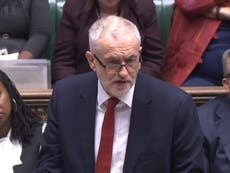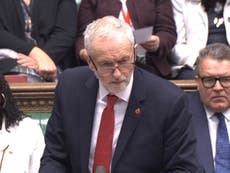I used to work as an MP's assistant – I know why the Westminster scandal happened
In Parliament, there is no independent HR department, no proper grievance procedure, no real consequences for those who step out of line. Numerous aides who tried to report cases involving them or their colleagues were told there was nothing that could be done


MPs got a terrible shock at the weekend. As they woke up to breakfast in their constituencies, roaring newspaper headlines informed them of an abuse row rocking Parliament. What a surprise it must have been to learn that dozens of their friends and colleagues – the people they have spent most of their time working alongside, sometimes for decades – stood accused of harassment and abuse.
Except, of course, it wasn’t. The way that parliamentarians clambered over each other to express shock and anger and demand change belies a much more insidious truth: that many of them knew what was happening and, with a few commendable exceptions, did nothing about it.
Parliament is a cauldron of gossip. Tales of incidents and experiences reverberate around the corridors of power. More than most workplaces, it is an environment where reputations are quickly established: in many places, people know who treats their staff badly, who can’t keep their hands to themselves, who uses their position of power to exploit others. The same few names come up time and time again. Some MPs who campaign for workers’ rights practise little of what they preach, some pretend to be family men while behaving in a very different way, others champion gender equality while treating their own female staff especially badly.
The headlines this week have focused on harassment that is sexual in nature. These cases, while distinct in some ways, are a consequence of a wider problem: a system that for decades has allowed some MPs to treat staff however they like, with impunity not just from their victims but, crucially, from their colleagues. Other forms of abuse are equally common. There are countless horror stories: of bullying, victimisation, hard-working aides reduced to tears, staff pitted against colleagues, employees forced to quit and seek counselling after months of psychological abuse.
It needs saying that most MPs are, for the most part, good people and good bosses. Staff enjoy working for them and are rewarded with meaningful jobs and exciting opportunities. The two MPs I once worked for were kind and supportive. Yet a not-insignificant number of parliamentary staff are not so lucky.
The truth is that the nature of how MPs employ staff leaves junior workers open to various forms of exploitation and abuse at the hands of what is – and this is important – a minority of MPs. In Parliament, there is no independent HR department, no proper grievance procedure, no real consequences for those who step out of line. Numerous aides who tried to report cases involving them or their colleagues were told there was nothing that could be done.
None of this is a secret: MPs from all parties have known about those types of incident for years, and known that the system allows their colleagues to get away with it. Countless incidents of deeply inappropriate behaviour by MPs – sometimes sexual in nature, more often not – have therefore gone unchallenged. Unlike the expenses scandal, which was contained largely in private documents, the behaviour of MPs towards their staff and others is clearly visible and has numerous witnesses. Why, then, was nothing done?
Politicians of all parties have spent years fighting against perceived unfairness elsewhere while they ignored the burning injustices in their midst. Parliamentary staff have long discussed disturbing incidents among themselves and in many cases with MPs, but no one in a position of actual power felt concerned enough to demand significant change. Junior employees were left with nowhere to turn as their bosses tolerated a system that was failing them. None of the tales MPs heard, apparently, led them to believe that fundamental change was needed to protect vulnerable and often junior employees. A few tried; far more remained silent.
Had more of our national leaders come forward to call out their colleagues or demand real change to how Parliament is run, the scandal only now emerging into the public eye could have been addressed earlier, and victims spared an array of traumas. That they felt they could not is a shameful symptom of a hush-hush culture pervading Westminster and Whitehall, which allows the powerful to protect the powerful and, all too often, leaves the vulnerable among them to fend for themselves.
If the culture of silence among staff is understandable, the culture of silence among MPs is inexcusable. Researchers, secretaries and advisers kept quiet, and continue to do so, for fear of losing their jobs and because those they were wronged by hold positions of real power. MPs, meanwhile, failed to act because the problem did not directly affect them. They did not call out well-known culprits because bizarrely, they did not see it as their business. For some, the sense of loyalty to their party and their colleagues, or to their own political ambitions, trumped their concern for junior parliamentary staff employed by other MPs. Others simply did not listen to what they were being told; only now are they realising that the stories they heard were a sign of a much broader problem.
Party leaders and whips were especially familiar with the allegations, and too often swept them under the carpet or, worse still, treated them as useful information for next time an MP needed whipping into line. As the truth emerged, Theresa May’s spokesman refused to deny that the Prime Minister was aware of allegations against Tory MPs and, as far as we can tell, knowingly ignored them. To be clear, the Prime Minister of the United Kingdom may have knowingly failed to report potential crimes committed by her own colleagues. That should be a scandal in itself.
Other party leaders are barely less culpable. Jeremy Corbyn admitted at the weekend he is fully aware that harassment “thrives” in Westminster and has done “for far too long”. He has been an MP for 34 years. It is, as far as anyone can tell, the first time he has ever felt compelled to make that disturbing knowledge public, let alone demand anything is done about it. It has emerged that Mr Corbyn was aware of sexual harassment allegations against Labour MP Kelvin Hopkins in 2015. A few months later, he promoted him to the shadow cabinet.
Since the scandal broke, many MPs have taken to the airwaves, posted tweets, rushed off articles and queued up in the Commons to denounce a culture of harassment that many of them have been implicitly tolerating for years. The sudden demands for change – for independent investigators, changes to procedures, cultural shifts – are being made now only because the tales of what goes on have been made public. While they remained behind Westminster’s walls, virtually no MP called for things to be done differently or called for the changes they now consider so urgent.
Why now, we should ask? Why after all these years, after all the disturbing tales that those who spend years in Parliament will have heard? What has changed? The truth is that nothing has. The problem has not got worse. There has been no defining event. It is simply that, after decades of silence, and in a case reminiscent of Harvey Weinstein and Hollywood, people outside the Westminster bubble have begun to hear the truth. MPs now feel they have to act. It is not unreasonable to ask why they waited until they were forced to do so.
Still, at least the time has come – thanks mostly to victims who have spoken out. Some of those who were mistreated by MPs have gone public with their experiences. Hundreds if not thousands more have not, and never will.
As the expenses scandal was a turning point for how MPs managed their finances, this one must fundamentally fix how some of them manage their staff. Part of the problem is the unusual nature of the job: MPs choose who they employ, how they treat them, what they pay them and when they sack them. They are the chief exec, the line manager, the funder and the HR department. This allows them to act with impunity and means there is nowhere to turn for those on the receiving end of abuse.
That needs to change. At the very least, an independent grievance procedure and an independent HR unit should be established in Parliament to ensure staff have a meaningful voice of their own. There should also be a sweeping review to ensure that 21st Century employment practices are implemented across Westminster and that MPs are giving compulsory training and support in managing their staff. They should also consider whether staff should be appointed and managed by individual MPs but employed by parliamentary authorities, which would add an element of independence that currently does not exist.
The tip of the iceberg that has finally been exposed must not now be ignored. It should be recognised as a symptom of a much wider problem that, for far too long, has been shamefully swept under the plush parliamentary carpets.







Join our commenting forum
Join thought-provoking conversations, follow other Independent readers and see their replies